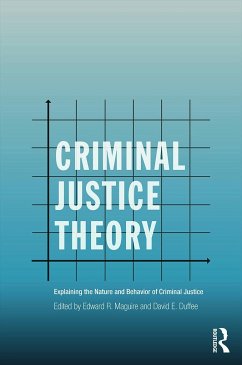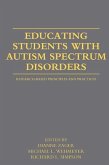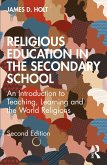Criminal Justice Theory
Explaining the Nature and Behavior of Criminal Justice
Herausgeber: Maguire, Edward R.; Duffee, David E.
Criminal Justice Theory
Explaining the Nature and Behavior of Criminal Justice
Herausgeber: Maguire, Edward R.; Duffee, David E.
- Broschiertes Buch
- Merkliste
- Auf die Merkliste
- Bewerten Bewerten
- Teilen
- Produkt teilen
- Produkterinnerung
- Produkterinnerung
Criminal Justice Theory, Second Edition is the first and only text, edited by U.S. criminal justice educators, on the theoretical foundations of criminal justice, not criminological theory. This new edition includes entirely new chapters as well as revisions to all others, with an eye to accessibility and coherence for upper division undergraduate and beginning graduate students in the field.
Andere Kunden interessierten sich auch für
![Educating Students with Autism Spectrum Disorders Educating Students with Autism Spectrum Disorders]() Educating Students with Autism Spectrum Disorders87,99 €
Educating Students with Autism Spectrum Disorders87,99 €![Religious Education in the Secondary School Religious Education in the Secondary School]() James HoltReligious Education in the Secondary School152,99 €
James HoltReligious Education in the Secondary School152,99 €![Religious Education in the Secondary School Religious Education in the Secondary School]() James HoltReligious Education in the Secondary School35,99 €
James HoltReligious Education in the Secondary School35,99 €![Wrongful Convictions and Miscarriages of Justice Wrongful Convictions and Miscarriages of Justice]() Wrongful Convictions and Miscarriages of Justice230,99 €
Wrongful Convictions and Miscarriages of Justice230,99 €![School Leadership for Authentic Family and Community Partnerships School Leadership for Authentic Family and Community Partnerships]() School Leadership for Authentic Family and Community Partnerships69,99 €
School Leadership for Authentic Family and Community Partnerships69,99 €![Ecofeminism and Systems Thinking Ecofeminism and Systems Thinking]() Anne StephensEcofeminism and Systems Thinking199,99 €
Anne StephensEcofeminism and Systems Thinking199,99 €![Understanding Hermeneutics Understanding Hermeneutics]() Lawrence Kennedy SchmidtUnderstanding Hermeneutics56,99 €
Lawrence Kennedy SchmidtUnderstanding Hermeneutics56,99 €-
-
-
Criminal Justice Theory, Second Edition is the first and only text, edited by U.S. criminal justice educators, on the theoretical foundations of criminal justice, not criminological theory. This new edition includes entirely new chapters as well as revisions to all others, with an eye to accessibility and coherence for upper division undergraduate and beginning graduate students in the field.
Hinweis: Dieser Artikel kann nur an eine deutsche Lieferadresse ausgeliefert werden.
Hinweis: Dieser Artikel kann nur an eine deutsche Lieferadresse ausgeliefert werden.
Produktdetails
- Produktdetails
- Criminology and Justice Studies
- Verlag: Taylor & Francis Ltd
- 2 ed
- Seitenzahl: 504
- Erscheinungstermin: 3. März 2015
- Englisch
- Abmessung: 229mm x 152mm x 27mm
- Gewicht: 698g
- ISBN-13: 9780415715195
- ISBN-10: 0415715199
- Artikelnr.: 41612603
- Herstellerkennzeichnung
- Libri GmbH
- Europaallee 1
- 36244 Bad Hersfeld
- gpsr@libri.de
- Criminology and Justice Studies
- Verlag: Taylor & Francis Ltd
- 2 ed
- Seitenzahl: 504
- Erscheinungstermin: 3. März 2015
- Englisch
- Abmessung: 229mm x 152mm x 27mm
- Gewicht: 698g
- ISBN-13: 9780415715195
- ISBN-10: 0415715199
- Artikelnr.: 41612603
- Herstellerkennzeichnung
- Libri GmbH
- Europaallee 1
- 36244 Bad Hersfeld
- gpsr@libri.de
Edward R. Maguire is Professor of Justice, Law & Criminology in the School of Public Affairs at American University in Washington, DC. Professor Maguire received his Ph.D. in Criminal Justice from the University at Albany in 1997. He has held previous positions at George Mason University, the University of Nebraska, the U.S. Department of Justice, and the United Nations. From 2004-2010, he led a series of studies that examined gangs, guns and violence in Trinidad and Tobago. From 2006-2010, he led a field study of sex trafficking in minors in the Philippines. He is currently leading impact evaluations and other studies related to policing, gangs, firearms, violence, and youth risk in El Salvador, Uruguay, the U.S., and several Caribbean nations. He has written or edited three books and more than sixty journal articles and book chapters on a variety of topics in criminology and criminal justice. David E. Duffee is Professor Emeritus of Criminal Justice, University at Albany, and former dean of the School of Criminal Justice, from which he received his Ph.D. in 1973. His research interests are in planned change in criminal justice agencies and communities and in criminal justice theory. His first work in criminal justice theory, Explaining Criminal Justice, received the book of the year award from the Academy of Criminal Justice Sciences. His two most recent projects were (1) as a member of the research team of Service Outcomes Action Research (SOAR), a continuing partnership between two child welfare agencies and the University at Albany, and (2) as study director for the Assessment Protocol in the Arizona State University sites of Criminal Justice Drug Abuse Treatment Studies II.
Part I THE IDEA OF CRIMINAL JUSTICE THEORY. 1. Why Is Criminal Justice
Theory Important? 2. Foundations of Criminal Justice Theory 3. Why Is There
So Little Criminal Justice Theory? Neglected Macro- and Micro-Level Links
Between Organization and Power. Part II THEORIES OF POLICING 4. Explaining
Police Organizations 5. Understanding Variety in Urban Community Policing:
An Institutional Theory Approach 6. The "Causes" of Police Brutality:
Theory and Evidence on Police Use of Force. Part III THEORIES OF THE COURTS
7. Assessing Blameworthiness and Assigning Punishment: Theoretical
Perspectives on Judicial Decision Making 8. Courts and Communities: Toward
a Theoretical Synthesis 9. A Qualitative Study of Prosecutors' Decision
Making in Sexual Assault Cases. Part IV THEORIES OF CORRECTIONS 10. A Test
of a Turnover Intent Model: The Issue of Correctional Staff Satisfaction
and Commitment 11. The Construction of Meaning During Training for
Probation and Parole 12. Examining Correctional Resources: A
Cross-Sectional Study of the States Part V CONCLUSION 13. Directions for
Theory and Theorizing in Criminal Justice
Theory Important? 2. Foundations of Criminal Justice Theory 3. Why Is There
So Little Criminal Justice Theory? Neglected Macro- and Micro-Level Links
Between Organization and Power. Part II THEORIES OF POLICING 4. Explaining
Police Organizations 5. Understanding Variety in Urban Community Policing:
An Institutional Theory Approach 6. The "Causes" of Police Brutality:
Theory and Evidence on Police Use of Force. Part III THEORIES OF THE COURTS
7. Assessing Blameworthiness and Assigning Punishment: Theoretical
Perspectives on Judicial Decision Making 8. Courts and Communities: Toward
a Theoretical Synthesis 9. A Qualitative Study of Prosecutors' Decision
Making in Sexual Assault Cases. Part IV THEORIES OF CORRECTIONS 10. A Test
of a Turnover Intent Model: The Issue of Correctional Staff Satisfaction
and Commitment 11. The Construction of Meaning During Training for
Probation and Parole 12. Examining Correctional Resources: A
Cross-Sectional Study of the States Part V CONCLUSION 13. Directions for
Theory and Theorizing in Criminal Justice
Part I THE IDEA OF CRIMINAL JUSTICE THEORY. 1. Why Is Criminal Justice
Theory Important? 2. Foundations of Criminal Justice Theory 3. Why Is There
So Little Criminal Justice Theory? Neglected Macro- and Micro-Level Links
Between Organization and Power. Part II THEORIES OF POLICING 4. Explaining
Police Organizations 5. Understanding Variety in Urban Community Policing:
An Institutional Theory Approach 6. The "Causes" of Police Brutality:
Theory and Evidence on Police Use of Force. Part III THEORIES OF THE COURTS
7. Assessing Blameworthiness and Assigning Punishment: Theoretical
Perspectives on Judicial Decision Making 8. Courts and Communities: Toward
a Theoretical Synthesis 9. A Qualitative Study of Prosecutors' Decision
Making in Sexual Assault Cases. Part IV THEORIES OF CORRECTIONS 10. A Test
of a Turnover Intent Model: The Issue of Correctional Staff Satisfaction
and Commitment 11. The Construction of Meaning During Training for
Probation and Parole 12. Examining Correctional Resources: A
Cross-Sectional Study of the States Part V CONCLUSION 13. Directions for
Theory and Theorizing in Criminal Justice
Theory Important? 2. Foundations of Criminal Justice Theory 3. Why Is There
So Little Criminal Justice Theory? Neglected Macro- and Micro-Level Links
Between Organization and Power. Part II THEORIES OF POLICING 4. Explaining
Police Organizations 5. Understanding Variety in Urban Community Policing:
An Institutional Theory Approach 6. The "Causes" of Police Brutality:
Theory and Evidence on Police Use of Force. Part III THEORIES OF THE COURTS
7. Assessing Blameworthiness and Assigning Punishment: Theoretical
Perspectives on Judicial Decision Making 8. Courts and Communities: Toward
a Theoretical Synthesis 9. A Qualitative Study of Prosecutors' Decision
Making in Sexual Assault Cases. Part IV THEORIES OF CORRECTIONS 10. A Test
of a Turnover Intent Model: The Issue of Correctional Staff Satisfaction
and Commitment 11. The Construction of Meaning During Training for
Probation and Parole 12. Examining Correctional Resources: A
Cross-Sectional Study of the States Part V CONCLUSION 13. Directions for
Theory and Theorizing in Criminal Justice









